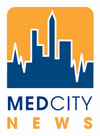
Medical imaging technology company Bioptigen received a warning from the Food & Drug Administration alleging that the company is marketing its eye imaging scanner without proper approvals.
The Research Triangle Park, N.C.-based company makes a medical device that allows for imaging of the inner areas of the eye. The company has marketed the product for research as well as medical applications.
The FDA’s Feb. 9 letter raised a warning about Bioptigen’s hand-held imaging device. The company won 510(k) clearance in 2006 for a tabletop scanner for use in the “evaluation of ophthalmic tissue in routine clinical examinations as an aid in the diagnosis of conditions that affect the optical scattering properties of ocular tissue.”

The hand-held imaging system represents a modified device design, and the company’s website and brochures claim that the hand-held system may be used for specific diagnostic purposes such as retinopathy of prematurity, pediatric retinoblastoma and shaken baby syndrome, according to the FDA. These changes are outside of the company’s 510(k) clearance, the watchdog agency wrote in the letter.
Bioptigen CEO Eric Buckland acknowledged the warning letter but he declined to answer questions.
“We are preparing a response,” he said. “I’d rather not talk about it until after we submit the response.”
Bioptigen was founded in 2004 based on spectral domain technology developed in the biomedical engineering department of Duke University’s Pratt School of Engineering>. Bioptigen licensed the technology from Case Western Reserve University (PDF), where Professor Joseph Izatt initially worked on the technology before leaving for a position at Duke University in 2001.
Bioptigen’s imaging systems use a technology called optical coherence tomography, or OCT. The company’s website describes OCT as analogous to ultrasound, using light waves instead of sound waves. The backscattered light is processed to develop a high-resolution image that can be used for analysis without physical contact with the subject. That makes the technology particularly helpful with non-cooperative patients, such as infants.
Bioptigen’s last round of financing was also its first, a 2006 series A round that brought Bioptigen $1.3 million from the Piedmont Angel Network of Greensboro, N.C., along with several individual investors.

